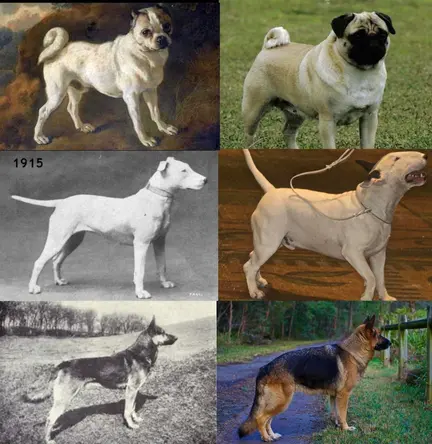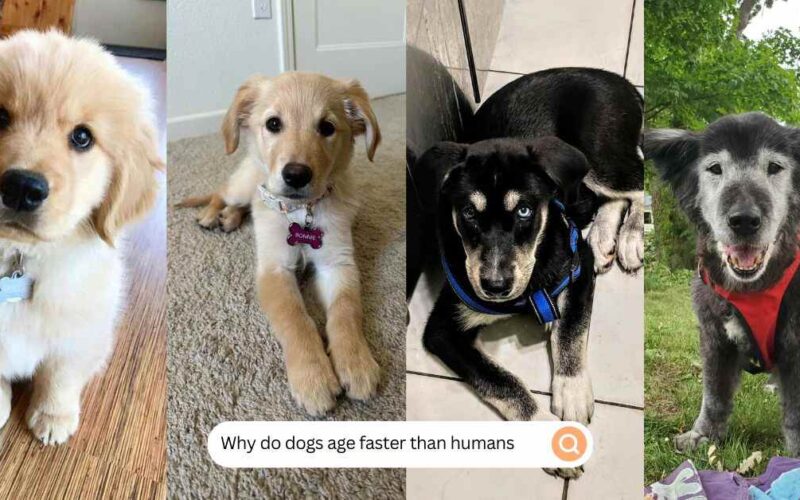About the Author: Dr. Finlay Tayler (DVM), a Harvard veterinary graduate, brings his five years of diverse experience to MyPetDoggie. Passionate about all animals, and a proud dog owner, he balances full-time veterinary practice with contributing expert insights to our content. Dr. Tayler’s love for the outdoors, cycling, and love for dogs enrich his holistic perspective on dogs care.
So, you finally searched for why do dogs age faster than humans (us). I know, I already foreseen it that someday you will look for the answer and that’s why I put my time and research in this blog post to answer this question.
Dogs are our loyal companions. If you ever have an outlook on dogs’ growth, you may realize that humans’ growth rate of getting old is slower than dogs. You may adopt a puppy and watch him grow into an adult in a very short time period.
From watching them running behind you and playing with you to sitting tired in a corner or spending all day sleeping. You may have observed how their energy level shifts from high to low. This seems upsetting and heartbreaking.
The point here arises Why did this happen so quickly? How do our little puppies turn into adult dogs in a moment? Dogs are genetically designed in such a way. Their aging accelerates in the first year, which tends to set their lifespan short. Not only genes, but high metabolism also plays a part in hastening their aging process. That’s why we can say that they age faster than us.
If I dive into the details, then I may surprise you with the fact that there is a difference in growth rate between large and small breeds of dogs. Large breed dogs have a shorter lifespan than small breed dogs.
To uncover this intriguing biological truth, come and explore with me. Let me unravel the mystery of how nature has designed the lifespan of our dogs.
Why Do Dogs Age Faster Than Humans
The primary reason for dogs aging faster than humans is the difference in genetics and metabolism. The rate of cell division is also one of the factors influencing their growth. Hence 15 human years equals the first year of a medium-sized dog’s life.
Rapid cell division takes place in dogs which is the leading reason for genetic mutations.
The dog is not a big animal like an elephant. It is to be observed that small animals have faster metabolism which causes them to age faster.

Compared to humans, dogs are more prone to environmental conditions. Harsh environmental conditions such as more exposure to pollutants can also be a contributing factor to fast aging. Outer environments can influence the activities going on inside the body of dogs. Humans get more time to experience and mature, on the other hand, dogs get less time to deal with everything.
Collectively, it can be said that there are various factors including environmental conditions, genetics, and metabolism that cause dogs to age faster than humans.
Do Both Dogs and Cats Age Faster than Humans?
The average life expectancy of humans is 70-80 years or they can live longer than this. In contrast, dogs’ average lifespan is around 10-13 years. Cats have an average span of 12-16 years. Their lifespan can vary depending upon the care they get and the conditions they are getting to survive. Their breed can also be a reason for variation in their lifespan.

Due to faster metabolism, their bodies undergo many changes from time to time. This contributes to aging quickly, as their activities take place at a faster pace compared to humans. This clearly shows that humans age slower than cats and dogs.
10 Common Health Struggles for Older Dogs?
As dogs get older, they face many health problems. The natural aging process causes changes in every organism. For all the years of life, every organism’s body undergoes many changes.

This affects the quality of life. I’ll discuss some common problems that dogs have to go through.
Joint Pain and Arthritis:
With time, humans experience joint stiffness and arthritis. Just like this, dogs also suffer from the same problem. They can feel ache in their joints and many other muscle-related problems. Because of this, dogs may have difficulty in mobility. Pain can also be a torture for them.
Dental Issues:
Healthy teeth make it easier to chew the food. But as dogs grow old, unfortunately, their teeth become weak. Many dental problems including tooth decay, gum disease, or tooth loss may become a nightmare for dogs. These problems are very common in older dogs just like aged humans. Dogs feel difficulty in eating and discomfort because of these problems. Make sure to not leave these problems untreated, because they may become a reason for other health issues.
Cognitive Dysfunction:
Some humans experience dementia when they grow old, just like these dogs suffer from cognitive dysfunction. It is a condition in which they can go through memory loss, changed behavior, and changes in sleep patterns. They might forget about many things like their toys.
Vision and Hearing Loss:
The common problem that dogs have to face is the loss of vision and hearing. This affects their quality and perception of life. It becomes difficult for them to deal with their surrounding environment. If you ever have a problem in seeing or hearing, then you can relate to the trouble that dogs have to go through.
Weight Management:
When dogs get older, they feel less active. Their potential gets weaker. This means they don’t get involved in physical activities, as they used to. Less physical activity means weight gain. Obesity is the prime cause of many other health problems. Being obese also feels like a burden. The life standard automatically lowers down for obese dogs.
Heart and Respiratory Problems:
As I have mentioned above, older dogs don’t take part actively in physical activities. They may develop heart and respiratory problems. It becomes difficult for them to keep their heart strong. The risk of high blood pressure and reduced cardiac function gets higher in older dogs. They may face problems in breathing as their lungs don’t function properly in old age.
Kidney and Liver Function:
Kidney and liver function problems are serious problems. The kidneys’ function is to keep the internal body clean. The ability to filter waste products gradually decreases because of a kidney-related disease known as chronic kidney disease. It is a common disease in older dogs. Moreover, kidney stones can also be a reason to damage the potential of the kidney.
Hepatitis and liver tumors are problems related to the liver. Both can affect the working and health of the liver. It is important to consult the veterinarian, to deal with these problems.
Cancer:
During their lifespan, dogs have to go through rapid cell division. This may become a cause of cancer at an older age. Cancer can be in the form of a tumor or abnormal cell growth in any organ. Try to notice the symptoms at an early stage and help them to deal with this problem.
Digestive Problems:
The digestive system’s ability to process food properly becomes weak at an older age. In such a situation, the efficiency of digestion decreases. Constipation becomes very common in older dogs. Maintain their diet, and give them food that is easy to digest. This may be helpful for them to prevent these problems.
Immune System Weakening:
Immune systems fight against diseases to keep the body healthy. Unfortunately, when aging happens, the immune system becomes weak. Its ability to fight diseases slows down. This leads to many common diseases. Infections and regular illness become more common.
Why Do Large Breeds Have a Shorter Lifespan Than Small Breeds?
Many large breeds, just like the German Shepherd or Golden Retriever, age faster than small breeds like the Pomeranian and Shih Tzu. This happens because large breed dogs have larger bodies as compared to small breeds.

Their bodies grow faster and they bear more stress on their internal systems than small breeds. To maintain a large and fast-growing body, a heavy workload is required for the internal organs and systems.
Large-breed dogs are more exposed to getting age-related diseases because of their size and genetics. Fast growth during the early months of the dog puts stress on organ development. There are many inherent differences between different breeds that cause a distinction in their average lifespan. Moreover, it is just a general idea that large breeds have a shorter lifespan than small breeds.
How To Help Your Dog Enjoy a Long, Happy Life
I have given you a general idea of how and why dogs age faster and what challenges they have to face once they grow older. I know this fact might upset you, but you can help them to have a happy and long life.

If you take good care of your dog, they can live more than their estimated lifespan. I am going to share some tips with you to give your dog a healthy and happy life.
Balanced Diet and Nutrition
Your first preference should be to keep an eye on your dog’s food. A healthy and balanced diet decides the health of your dog. Make sure to give all the necessary nutrients that are required to sustain a healthy life. Every dog has different requirements, for this purpose consult your vet. He will guide you with the basic food requirements for your dog.
Regular Exercise
Regular exercises benefit your dog mentally and physically. Make sure to keep them engaged in different exercises regularly. Play with them, take them for a walk, or let them roam in the yard to maintain their body. It will also help them to be mentally active. Exercise will keep your dog’s muscles moving and it can help him not get affected by any muscle-related problem in their old age.
Routine Veterinary Care
To keep a health check, veterinary visits are a must. It will help to deal with any potential health issue at an early stage. Regular check-ups help you to stay updated regarding your dog’s health. To prevent common and deadly diseases, get your dog vaccinated on time. If your dog is aging, it is necessary to have frequent check-ups. If your dog is showing changes in behavior, a veterinarian visit can also help to identify the cause.
Dental Care
Healthy teeth mean happy meals. If your dog’s teeth are healthier, he will enjoy his meal. It is necessary to care about dental health. Clean their teeth regularly with your veterinarian. Maintain his good oral hygiene. Dental care prevents dental problems like tooth loss and gum disease.
Mental Stimulation
Engage your dog in activities like puzzle toys. Such toys require problem-solving strategies to get access to treats. Play hide and seek with him. Dogs have good-smelling power. Hide treats or scented objects and let him find them. Use food dispensing toys to provide him with mental stimulation.
Take him for a walk regularly and change routes occasionally. He will get to explore new things. It will also help him to keep his senses engaged. The same sights, scents and scenes could be boring for him. Mental stimulation is necessary for a dog’s health and happy and well-balanced life.
Grooming and Hygiene
Take care of your dog’s grooming and hygiene. If your dog gets dirty, bathe him. Trim his nails to prevent any discomfort. Brush his coat regularly. Clean your dog’s ear regularly as per your vet’s advice. Use a damp cloth to clean your dog’s eyes. Brush his teeth using a toothbrush and toothpaste specific for dogs. Trim the excessive fur to keep your dog clean.
Your dog needs regular grooming. It helps your dog to look clean. Grooming also plays a role in leading a healthy life. Because a dirty body attracts germs and parasites that can cause various health problems.
Quality Time and Bonding
Spend quality time with your dog to bond well with him. Play with him, take him out, give him the attention he needs. Let your dog socialize so he can interact with others. Try to be engaged with your dog. Be present for him. Don’t let him feel alone. It creates happy memories. Giving attention to your dog keeps him healthy. He feels more active and such happy moments fill his mind with positivity. Your strong bond with your dog will keep him away from stress.
Mental and Physical Challenges
Mental and physical challenges keep your dog active and healthy. Activities like fetching games, running, and training can be very helpful. Teach your dog new tricks and different commands, train him using mini obstacle courses, and set up puzzle games for him. All these activities are extremely appealing and interactive for dogs. Dogs love to utilize their time in such challenges. This way they stay healthy, happy, and active.
Age- Appropriate Change
At different stages of life, dogs need different care and consideration. At an early stage of life, dogs grow rapidly and they need a proper and balanced diet. From 6 to 18 months, they observe behavioral changes. You should have great patience at this stage. As dogs turn into adults, they need regular exercise and a maintained diet. Manage their weight properly.
Older dogs need extra care, as they lack energy. Adjust their diet according to their need and health. Schedule their regular health checks, provide them with mental stimulation, and pay more heed to their grooming and hygiene.
Love and Affection
To maintain a healthy relationship with your dog, it is essential to become their best friend. Give your dog the love and affection he deserves. It will help to strengthen your bond with him. Don’t use a harsh tone of voice when you are addressing your dog. Show him physical affection like gentle petting and ear scratches. Play with him and offer him healthy treats. Take him for outdoor adventures.
Avoid Overfeeding
Feed your dog according to his needs. Don’t stuff him with extra food. Overfeeding your dog will not provide him with the right amount of nutrients. Instead, it will make him overweight. Being overweight means dealing with a lot of health problems. A diet should be appropriate and according to the needs and requirements of your dog.
Regular Mental and Physical Health Check-ins
To avoid any stress or potential issues later, it is important to do regular mental and health check-ins. Observe the behavior of your dog regularly. If you notice any changes in your dog’s behavior or energy levels, it indicates that there might be something. If he is not eating or sleeping properly, he might not be feeling well mentally or physically. It may be an indication of a problem.
Do regular visits to your veterinarian. Managing your dog’s weight is essential. Weight loss or obesity can cause various health issues. Keep a check on his dental health and mobility. Check your dog’s skin, eyes, and ears regularly to prevent any infection.
Common Question:
Which dog has the highest age?
Chihuahuas are considered to have the highest lifespan among all breeds of dogs. But it is important to know that the lifespan of a dog is influenced by various factors including a well-maintained diet, care, exercise, and genetics.
Do dogs age 7 times faster than humans?
Yes, it is to be said that one year of humans’ lifespan is equal to seven years of dogs’ life. It shows that dogs age 7 times faster than humans.
How old is a 3-year-old dog?
The 3-year age of a dog is considered the early stages of adulthood. If you want to calculate the age of your age, you can simply multiply it by 7. It will give you a rough estimate of the dog’s life stage. A 3-year-old dog is equal to a human in his early twenties.
What is the golden age of a dog?
The senior years of a dog’s life are considered the ‘golden age’ of a dog. It varies from 7-10 years. This is the time when they experience age-related changes.
Why dogs don’t live as long as humans?
Dogs’ genetics are naturally designed in such a way that they age faster than humans. Other factors like metabolism, rapid cell division, size, and environmental factors also contribute to dogs’ lifespan. Dogs have a faster metabolism rate than humans.
How old is 7 in dog years?
A 7-year-old is considered a senior and mature age in dogs. If we roughly calculate it according to the 7-year rule, then it means a 7-year-old dog is equivalent to a 50-year-old human.
Conclusion
Dogs age faster than humans. Many facts and research show that dogs have a faster metabolism than humans, which causes rapid growth in their age. Dogs have to go through various mutations throughout their life.
Many environmental factors and evolutionary perspectives also play their part. But this is a general overview of their lifespan. If you take good care of them, maintain a well-balanced diet, and regulate their mental and physical health then there is a high chance of positive influence on their age.
Older dogs have to face many health struggles. Make sure to take care of their health and don’t let them suffer. Give them your time and attention. Make these problems bearable for them and help them to maintain a quality life. I hope this insight into dogs’ lifespan will be helpful to you. If you have a dog, don’t forget to implement these suggestions!






